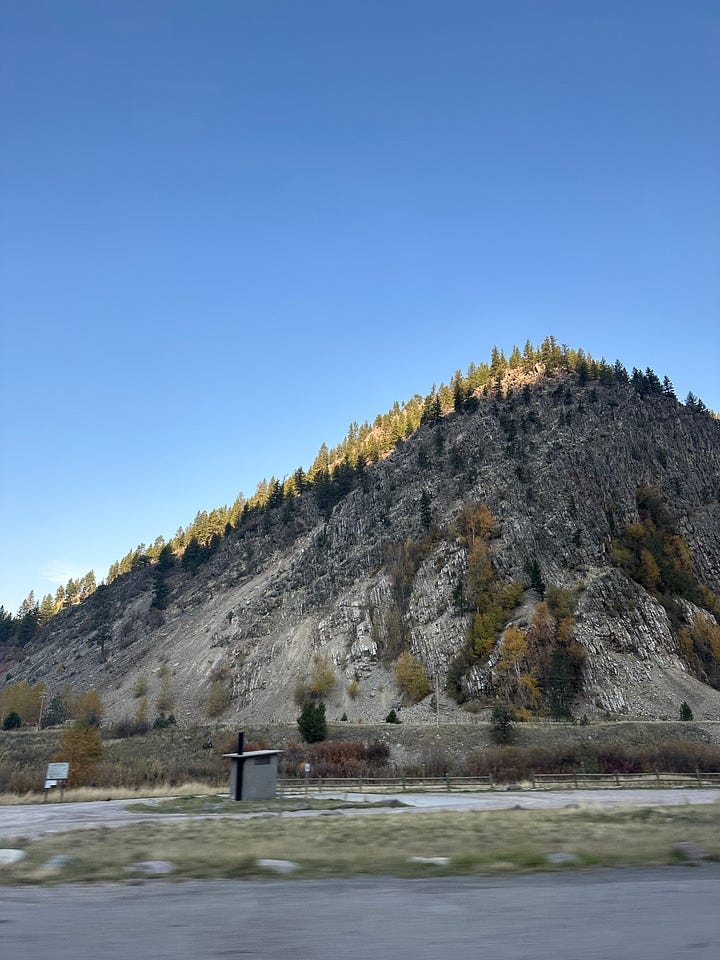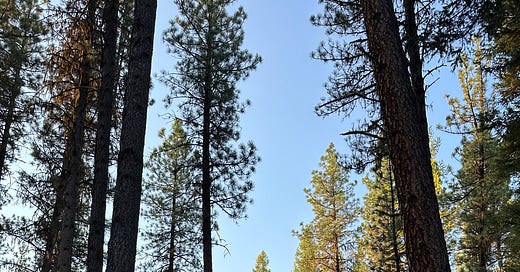A survival guide to work conferences
8 tips from someone who gets overstimulated easily in big crowds
I hadn’t been to a trade event in more than two years when I was invited to speak at Outdoor Media Summit (OMS) on a panel about marketing myself as a freelancer using Substack. They promised to reimburse me for flights and covered the cost of my all-inclusive ticket, plus, my calendar was clear, so I had few excuses to say no. I figured it would be nice to see familiar faces, especially fellow outdoor rec journalists, including a few of my editors at Trails and Backpacker.
The last time I gathered with my outdoor industry peers was in June 2022 for Outdoor Retailer, an event that was once the pinnacle of outdoor industry events. It was where journalists were schmoozed by brands and PR so that they’d potentially write about their products. (It was also technically a buying event, where retail buyers would preview new collections and decide whether or not to bring them into stores.) The three or four days consisted of running around the showroom floors, bouncing between meetings at different booths, collecting swag and snacks, skipping meals, and deciding between which happy hour and evening parties to attend. Food, booze, gear, and noteworthy attendees all factored into the decision. One year, I went to Helly Hansen’s ax-throwing party with the polar explorer (and buddy) Eric Larsen. Another year, Fjällräven hosted a rooftop party with meatball appetizers, flower crown crafts, and other Swedish delights.
For all of the shows, I worked as a staff writer for OR Daily, the show’s daily magazine that arrived on the doorstep of people’s hotels every morning. The few times I had a comped hotel, I loved opening my door to see the tangible proof of our hard work. Our nimble crew would spend all of the days interviewing and covering events, then writing and editing stories so they’d appear in the next day’s issue. It was like a daily newspaper, but even more lean, even more chaotic. I wrote everything from an obituary for Warren Miller to a roundup of outdoor activists. We even had a page dedicated to the best dogs of the show.
It was the dream, both fun and exhausting, when I was in my early 20s. To attend my first show, the first year Denver hosted it in January 2018, when I was living in Boulder, I even asked for PTO from my newspaper reporting job. Yep, I took vacation time from my job to work a freelancing job. I was that eager to walk those floors. But show after show, whether because the novelty wore off or I was burned out or a combination of both, I started to dread OR. I’d often get sick after or during. I’d be depleted for a whole week once it was over. And I’d totally crumble from the stress and pressure of our daily news cycle. I remember even crying at multiple shows. And I remember hiding in quiet corners to calm my nervous system. (I think I also caught the first bout of Covid there in February 2020.)
Now as a freelancer in my own little orbit, I recognize that trade shows can be immensely valuable for creating connections and getting face time with people. I know a lot of the people I do today because of those events. But I also think that industry gatherings can be immensely taxing and overwhelming, especially if you don’t have a plan and especially if you’re overstimulated easily. You can leave feeling totally fried, disappointed, and as though you didn’t make the most of your time. From my years of experience enduring the chaos of trade shows, I’ve pulled together a little survival guide that can apply to work conferences in any industry, at the request of my friend. It’s a compilation of my best tips and tricks for minimizing literal migraines and maximizing your opportunities. I hope you find it helpful. And let me know in the comments if you have any other tips to add!


1. Skip the events and activities that don’t serve you.
Conference schedules are jam packed with panels, talks, networking events, activities, dinners, one-on-one meetings, and parties. It’s typically go! go! go! to fit everything into a few days. If you attend every single thing on the agenda, there’s hardly any time for sleep. The crowd’s energy (and the shitty expo hall coffee) can only carry you so far. I like to look at the agenda ahead of time, make note of 1) the events that I’m most excited about and 2) the events I’d like to attend but wouldn’t mind skipping, and then see how I feel the day of. If I need an hour of peace in my hotel room or if I want to catch up with someone, I don’t feel guilty for ditching class. Plus, if it’s something I’m bummed I missed, I always ask the event organizers if they record sessions and if I can get a link afterwards.
2. Don’t expect to meet or catch up with everyone.
In the same way that you can’t be expected to RSVP to everything, you also can’t expect to get quality face time with everyone at these things. At OMS, I bumped into a friend from Boulder I hadn’t seen in five years. We said hi and hugged, but that was about all we had time for. I left the event feeling regretful we hadn’t spent more time together. But the reality is, neither of us had time for that. A work conference isn’t the best place to do that anyway. There were also other people I had hoped to meet and catch up with, but never found time to introduce myself. This is just how it goes, so I like to set the expectation ahead of time. Lean into the organic connections. You can always send an intro note after the event—or schedule a call to catch up with the friend you haven’t seen in five years.
3. Pack snacks and take yourself out to eat.
Your ticket will often come with a meal, sometimes even all three. While free food is enticing, cold croissants for breakfast and buffet salads for lunch—aka carb-heavy, protein-deficient meals—leave me feeling hungry. And you don’t want to be hungry at one of these events. Almost every day of OMS, I ordered coffee from an offsite coffee shop and paid for my own meals at restaurants downtown, whether it was breakfast, lunch, or dinner. I also packed an energy bars for each day to snack on. I like to save restaurants and coffee shops near my hotel on Google Maps ahead of time, just in case I need to satiate the tummy growl. Because if I’m well nourished, I’m more likely to tolerate the stimulation and happily make it through.





